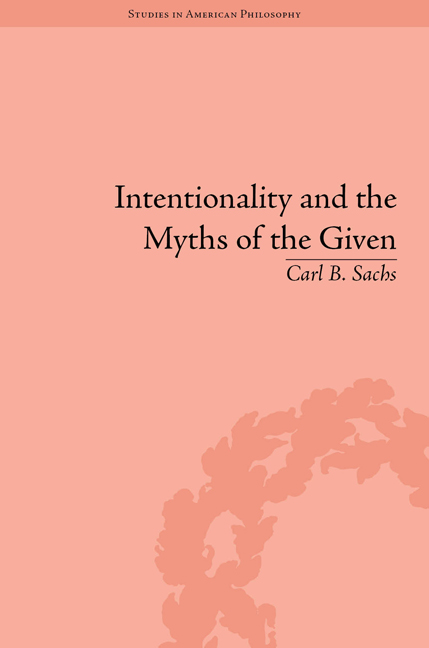Book contents
- Frontmatter
- Contents
- Acknowledgements
- Introduction: Why a New Account of Intentionality?
- 1 Intentionality and the Problem of Transcendental Friction
- 2 The Epistemic Given and the Semantic Given in C. I. Lewis
- 3 Discursive Intentionality and ‘Nonconceptual Content’ in Sellars
- 4 The Retreat from Nonconceptualism: Discourse and Experience in Brandom and McDowell
- 5 Somatic Intentionality and Habitual Normativity in Merleau-Ponty's Account of Lived Embodiment
- 6 The Possibilities and Problems of Bifurcated Intentionality
- Conclusion
- Appendix: Is Phenomenology Committed to the Myth of the Given?
- Works Cited
- Notes
- Index
2 - The Epistemic Given and the Semantic Given in C. I. Lewis
- Frontmatter
- Contents
- Acknowledgements
- Introduction: Why a New Account of Intentionality?
- 1 Intentionality and the Problem of Transcendental Friction
- 2 The Epistemic Given and the Semantic Given in C. I. Lewis
- 3 Discursive Intentionality and ‘Nonconceptual Content’ in Sellars
- 4 The Retreat from Nonconceptualism: Discourse and Experience in Brandom and McDowell
- 5 Somatic Intentionality and Habitual Normativity in Merleau-Ponty's Account of Lived Embodiment
- 6 The Possibilities and Problems of Bifurcated Intentionality
- Conclusion
- Appendix: Is Phenomenology Committed to the Myth of the Given?
- Works Cited
- Notes
- Index
Summary
Once widely known to have been one of the most prominent epistemologists of the first half of the twentieth century, today C. I. Lewis has largely faded into obscurity. This is highly unfortunate, because much of the landscape of analytic philosophy that we today take for granted, such as the debates about the analytic/synthetic distinction or about the intelligibility of ‘the Given’, took shape as White, Goodman, Quine, Firth, and Sellars argued amongst themselves in the wake of Lewis. In her recent history of American pragmatism, Cheryl Misak gives considerable priority to Lewis, noting that, ‘Indeed, Sellars perfectly exemplifies the spirit of the Peirce-Lewis brand of pragmatism … but his intellectual relationship to Lewis is another one of those gaps in scholarship that seems to plague Lewis's reputation’. I hope to remedy this omission by re-examining Lewis's contribution to epistemology and philosophy of mind and of language, the extent to which it is vulnerable to Sellarsian criticisms, and the extent to which, for all its flaws, Lewis's view attempts to capture something of the utmost importance for a correct understanding of intentionality.
To take one prominent example of how difficult the issues are, Robert Hanna provocatively claims that there is no such thing as the Myth of the Given, and that the error lies not just in Sellars, but rather in Lewis's continuation of a Hegelian error:
[The Myth of the Given] began in Hegel's misinterpretation of Kant, when Hegel wrongly claims that Kant is a subjective or phenomenal idealist.
[…]
- Type
- Chapter
- Information
- Intentionality and Myths of the GivenBetween Pragmatism and Phenomenology, pp. 21 - 42Publisher: Pickering & ChattoFirst published in: 2014

